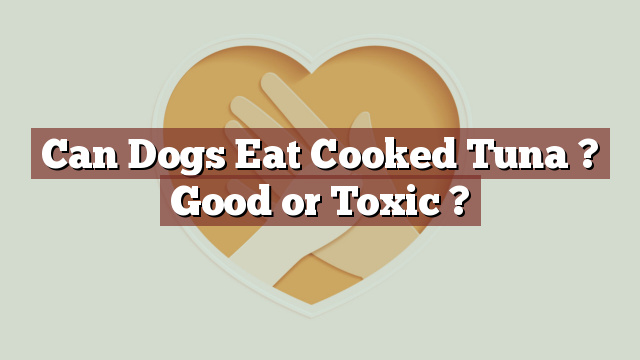Can Dogs Eat Cooked Tuna? Good or Toxic?
When it comes to our furry friends, it is important to be aware of the foods that are safe for them to consume. Dogs have different nutritional needs than humans, and certain foods that are harmless for us can be harmful or even toxic to them. In this article, we will explore whether dogs can eat cooked tuna and the potential risks or benefits associated with it.
Nutritional Value of Cooked Tuna for Dogs: Essential Facts
Tuna is a popular fish known for its rich flavor and high nutritional value. It is packed with protein, omega-3 fatty acids, vitamins such as vitamin D and B12, and minerals like selenium and potassium. These nutrients are essential for a dog’s overall health and well-being. However, it is important to note that the nutritional benefits of cooked tuna may vary compared to raw tuna due to the cooking process.
Is Cooked Tuna Safe or Toxic for Dogs? Expert Insights
Can dogs eat cooked tuna?
Yes, dogs can eat cooked tuna in moderation.
Cooked tuna is generally safe for dogs to consume, but it is crucial to ensure that the fish is properly cooked and prepared. Raw or undercooked tuna can contain harmful bacteria or parasites that can lead to health issues in dogs. Additionally, it is important to remove any bones, as they pose a choking hazard and can cause internal injuries.
Veterinary experts suggest that it is best to feed dogs plain, cooked tuna without any seasonings or added ingredients. Seasonings such as onions or garlic can be toxic to dogs and should be avoided. It is also advisable to feed cooked tuna as an occasional treat rather than a regular part of their diet.
Potential Risks and Benefits of Feeding Dogs Cooked Tuna
Feeding cooked tuna to dogs can have both potential risks and benefits. On the positive side, the protein and omega-3 fatty acids found in tuna can promote healthy skin and coat, support brain function, and boost the immune system. These nutrients can also aid in joint health and reduce inflammation in dogs with certain medical conditions.
However, it is important to be mindful of the potential risks associated with cooked tuna. As mentioned earlier, if the fish is not properly cooked or contains bones, it can lead to digestive issues, choking, or even internal injuries in dogs. Additionally, tuna is a fish with a high mercury content, and prolonged or excessive consumption can lead to mercury toxicity in dogs, which can have serious health consequences.
What to Do if Your Dog Eats Cooked Tuna? Veterinary Guidelines
If your dog accidentally ingests cooked tuna, it is important to monitor them for any signs of distress or discomfort. Mild digestive upset, such as vomiting or diarrhea, may occur, especially if the tuna was spoiled or not cooked properly. If you notice any concerning symptoms or if your dog has consumed a large amount of tuna, it is best to consult your veterinarian for guidance.
Conclusion: Cooked Tuna’s Impact on Dogs’ Health & Well-being
In conclusion, dogs can safely eat cooked tuna as long as it is properly cooked, bone-free, and given in moderation. The nutrients found in tuna can provide several health benefits for dogs, but it is important to be aware of the potential risks associated with consumption. Always remember to consult with your veterinarian before introducing any new foods to your dog’s diet to ensure their health and well-being.
Thank you for investing your time in exploring [page_title] on Can-Eat.org. Our goal is to provide readers like you with thorough and reliable information about various dietary topics. Each article, including [page_title], stems from diligent research and a passion for understanding the nuances of our food choices. We believe that knowledge is a vital step towards making informed and healthy decisions. However, while "[page_title]" sheds light on its specific topic, it's crucial to remember that everyone's body reacts differently to foods and dietary changes. What might be beneficial for one person could have different effects on another. Before you consider integrating suggestions or insights from "[page_title]" into your diet, it's always wise to consult with a nutritionist or healthcare professional. Their specialized knowledge ensures that you're making choices best suited to your individual health needs. As you navigate [page_title], be mindful of potential allergies, intolerances, or unique dietary requirements you may have. No singular article can capture the vast diversity of human health, and individualized guidance is invaluable. The content provided in [page_title] serves as a general guide. It is not, by any means, a substitute for personalized medical or nutritional advice. Your health should always be the top priority, and professional guidance is the best path forward. In your journey towards a balanced and nutritious lifestyle, we hope that [page_title] serves as a helpful stepping stone. Remember, informed decisions lead to healthier outcomes. Thank you for trusting Can-Eat.org. Continue exploring, learning, and prioritizing your health. Cheers to a well-informed and healthier future!

